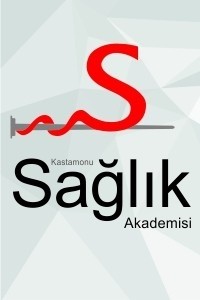Diz osteoartritinde kinezyolojik bantlamanın ağrı ve fonksiyonellik üzerine etkisi: Pilot Çalışma
Gonartroz, ağrı, fonksiyon, kinezyolojik bantlama
The effect of kinesiology taping on pain and functionality in knee ostheoarthiritis: Pilot Study
Gonarthrosis, pain, function, kinesiology taping,
___
- Ahn, I. K., Kim, Y. L., Bae, Y.-H., & Lee, S. M. (2015). Immediate effects of kinesiology taping of quadriceps on motor performance after muscle fatigued induction. Evid Based Complement Alternat Med., 2015(410526), 1-7.
- Bodur, H. (2011). Dünyada ve Türkiye’de osteoartrite güncel bakış; epidemiyoloji ve sosyoekonomik boyut. Turk Geriatri Derg., Özel sayı(1), 7-14.
- Cai, C., Au, I., An, W., & Cheung, R. (2016). Facilitatory and inhibitory effects of Kinesio tape: Fact or fad? J Sci Med Sport., 19(2), 109-112.
- Cho, H.-y., Kim, E.-H., Kim, J., & Yoon, Y. W. (2015). Kinesio taping improves pain, range of motion, and proprioception in older patients with knee osteoarthritis: a randomized controlled trial. Am J Phys Med Rehabil, 94(3), 192-200.
- Collins, N. J., Misra, D., Felson, D. T., Crossley, K. M., & Roos, E. M. (2011). Measures of knee function: International Knee Documentation Committee (IKDC) Subjective Knee Evaluation Form, Knee Injury and Osteoarthritis Outcome Score (KOOS), Knee Injury and Osteoarthritis Outcome Score Physical Function Short Form (KOOS‐PS), Knee Outcome Survey Activities of Daily Living Scale (KOS‐ADL), Lysholm Knee Scoring Scale, Oxford Knee Score (OKS), Western Ontario and McMaster Universities Osteoarthritis Index (WOMAC), Activity Rating Scale (ARS), and Tegner Activity Score (TAS). Arthritis Care Res., 63, 208-228.
- Csapo, R., & Alegre, L. M. (2015). Effects of Kinesio® taping on skeletal muscle strength—A meta-analysis of current evidence. J Sci Med Sport., 18(4), 450-456.
- Cutolo, M., Berenbaum, F., Hochberg, M., Punzi, L., & Reginster, J.-Y. (2015). Commentary on recent therapeutic guidelines for osteoarthritis. Seminars in arthritis and rheumatism, 44(6), 611-617.
- Françon, A., & Forestier, R. (2009). Spa therapy in rheumatology. Indications based on the clinical guidelines of the French National Authority for health and the European League Against Rheumatism, and the results of 19 randomized clinical trials. Bull Acad Natl Med., 193(6), 1345-1356.
- Fu, T.-C., Wong, A. M., Pei, Y.-C., Wu, K. P., Chou, S.-W., & Lin, Y.-C. (2008). Effect of Kinesio taping on muscle strength in athletes-a pilot study. J Sci Med Sport., 11(2), 198-201.
- Gamble, R., Wyeth-Ayerst, J., Johnson, E. L., Searle, W.-A., & Beecham, S. (2000). Recommendations for the medical management of osteoarthritis of the hip and knee. Arthritis & Rheumatism, 43(9), 1905-1915.
- Hinman, R., Bennell, K., Crossley, K., & McConnell, J. (2003). Immediate effects of adhesive tape on pain and disability in individuals with knee osteoarthritis. Rheumatology, 42(7), 865-869.
- Janwantanakul, P., & Gaogasigam, C. (2005). Vastus lateralis vastus medialis obliquus muscle activity during the application of inhibition and facilitation taping techniques. Clin Rehabil., 19(1), 12-19.
- Kase K, Wallis J, & T., K. (2003). Clinicaltherapeutic applications ofthe Kinesio Taping method ( 2nd ed.). Tokyo: Kinesio Taping Association.
- Kennedy, D. M., Stratford, P. W., Wessel, J., Gollish, J. D., & Penney, D. (2005). Assessing stability and change of four performance measures: a longitudinal study evaluating outcome following total hip and knee arthroplasty. BMC musculoskeletal disorders, 6(1), 3.
- Küçükdeveci, A. A. (2011). Osteoartiritte İşlevsel Değerlendirme Ölçütleri. Turk Geriatri Derg., Özel sayı (1), 37-44.
- Mascarin, N. C., Vancini, R. L., dos Santos Andrade, M., de Paiva Magalhães, E., de Lira, C. A. B., & Coimbra, I. B. (2012). Effects of kinesiotherapy, ultrasound and electrotherapy in management of bilateral knee osteoarthritis: prospective clinical trial. BMC Musculoskelet Disord., 13(1), 182.
- Mutlu, E. K., Mustafaoglu, R., Birinci, T., & Ozdincler, A. R. (2017). Does Kinesio Taping of the Knee Improve Pain and Functionality in Patients with Knee Osteoarthritis?: A Randomized Controlled Clinical Trial. Am J Phys Med Rehabil., 96(1), 25-33.
- Paker N, Buğdaycı D, Sabırlı F, Özel S, & Ersoy S. (2007). Knee Injury and Osteoarthritis Outcome Score: reliability and validation of the Turkish version. Türkiye Klinikleri J Med Sci., 27, 350-356.
- Poon, K., Li, S., Roper, M., Wong, M., Wong, O., & Cheung, R. (2015). Kinesiology tape does not facilitate muscle performance: A deceptive controlled trial. Man Ther., 20(1), 130-133.
- Sheane, B. J., Doyle, F., Doyle, C., O’Loughlin, C., Howard, D., & Cunnane, G. (2008). Sub-optimal pain control in patients with rheumatic disease. Clin Rheumatol., 27(8), 1029-1033.
- Tüzün, E., Eker, L., Aytar, A., Daşkapan, A., & Bayramoğlu, M. (2005). Acceptability, reliability, validity and responsiveness of the Turkish version of WOMAC osteoarthritis index. Osteoarthritis Cartilage., 13(1), 28-33.
- Uysal, F. G., & Basaran, S. (2009). Knee osteoarthritis/diz osteoartriti. Türk Fiz Tıp Rehab Derg., Özel Sayı(1), 1-7.
- Wageck, B., Nunes, G. S., Bohlen, N. B., Santos, G. M., & de Noronha, M. (2016). Kinesio Taping does not improve the symptoms or function of older people with knee osteoarthritis: a randomised trial. J Physiother., 62(3), 153-158.
- White, P. H., & Waterman, M. (2012). Making osteoarthritis a public health priority: Several initiatives are placing this chronic illness on the national agenda. Orthopaedic Nursing, 31(2), 92-97.
- Yayın Aralığı: Yılda 3 Sayı
- Başlangıç: 2016
- Yayıncı: Esra DEMİRARSLAN
Zeynep ARABACI, Ayşe DOĞRU, Jülide Gülizar YILDIRIM
IL7R GEN MUTASYON VE POLİMORFİZMLARİNİN AĞIR KOMBİNE İMMUN YETMEZLİKLİ HASTALARDAKİ SIKLIĞI
Atıl BİŞGİN, İbrahim BOĞA, Mustafa YILMAZ, Derya Ufuk ALTINTAŞ
Mehmet Dokur, Nilgün ULUTAŞDEMİR
POSTÜR DEĞİŞİKLİKLERİNİN GÖZİÇİ BASINCINA ETKİSİ
Diz osteoartritinde kinezyolojik bantlamanın ağrı ve fonksiyonellik üzerine etkisi: Pilot Çalışma
Şebnem AVCI, Mustafa YIĞILITAŞ, Mehmet ARSLAN, Kartal SELİCİ, Tamer ÇANKAYA
